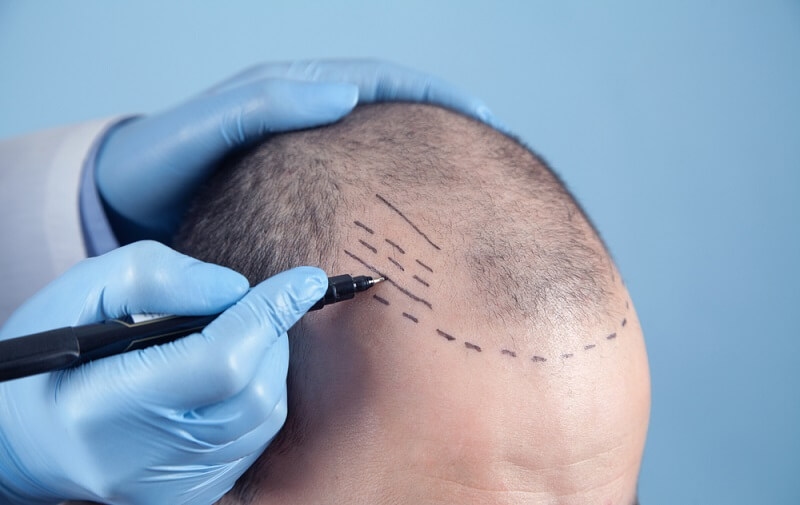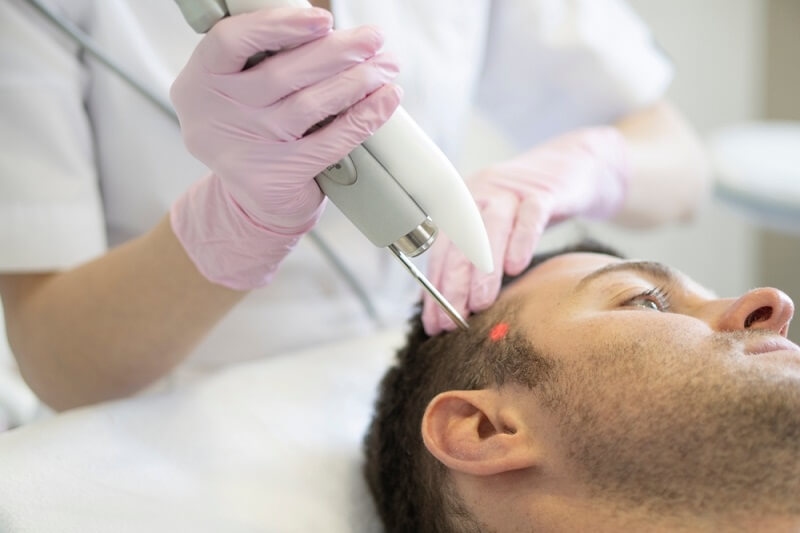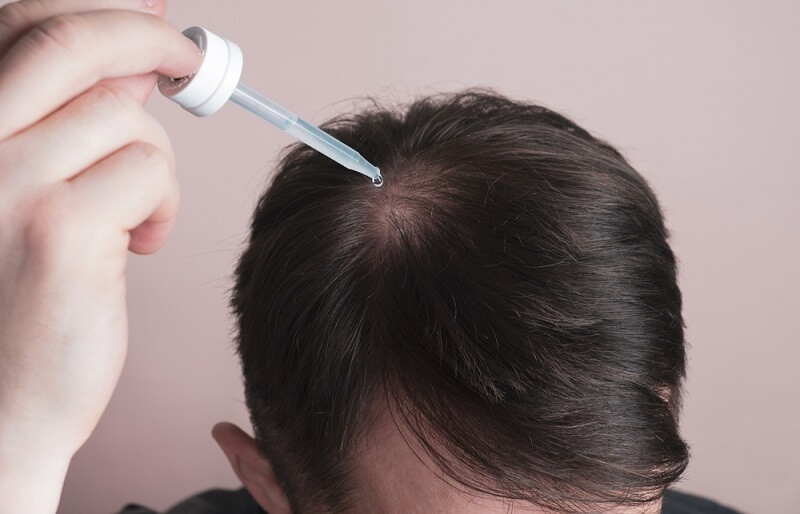Effective Options To Explore Hair Loss in Men Treatment

Todays fashion and appearance-led trends have signified the importance of good-looking hair. This has become a vital element of confidence and validation for people in their personal or professional lives. Especially in men, hairstyles become a prominent feature of their personality, giving them a better appeal in society. Hair loss in men, precisely the pattern baldness condition, has been a problem for many years, affecting their quality of life.
Hair loss in men is a common concern that can significantly impact self-esteem and confidence. There are various hair loss in men treatments available to address this issue. Medicine has progressed in studying the problems involved in hair loss and has made advancements in the solutions. Let's briefly understand some of these solutions:
Diagnosis of Hair Loss in Men

Accurate diagnosis is the first step towards effective hair loss in men's treatment. A few of the methods to understand the causes of hair loss in men and diagnose the conditions are as follows:
Self-Examination
When self-examining, pay attention to the pattern of hair loss. Androgenetic alopecia, the most common cause of hair loss in men, typically starts with a receding hairline and thinning at the crown. It's also essential to note if hair loss is sudden or gradual.
Consult a Dermatologist
Dermatologists are experts in diagnosing hair and scalp conditions. During your visit, they may use a specialized tool called a densitometer to assess hair density and perform a pull test to check for hair shedding.
Medical History
Providing a comprehensive medical history is vital. Remember to mention any medications you're taking, as some can contribute to hair loss. Family history is also crucial because hereditary factors often play a significant role in male pattern baldness.
Hair Loss in Men Treatment options

Remember that early detection can lead to more effective hair loss in men's treatment. Some of the well-known solutions are as follows:
Hair Transplants
Hair transplants are a surgically executed option that can provide remarkable results. Two common techniques are follicular unit transplantation (FUT) and follicular unit extraction (FUE). FUT involves removing a strip of skin with hair follicles, while FUE involves extracting individual follicles. The pulled hair is then transplanted into balding areas. Recovery time varies, but the results are often permanent.
Laser Treatment
Low-level laser therapy is the latest non-invasive hair loss in men treatment that has recently come to light. The devices used in Low-level laser therapy emit low-power laser light that stimulates follicles, encouraging hair growth. These devices are available for home use and as in-office treatments. While results may take time, many users report hair density and thickness improvements.
Lifestyle Changes
Adopting a healthy lifestyle can make a huge difference in managing hair loss in men's treatment. A balanced diet rich in vitamins (particularly vitamin D and biotin), minerals, and proteins contributes to better hair health. Regular exercise improves blood circulation, which benefits hair follicles. Stress reduction techniques such as yoga, meditation, or deep breathing exercises can help manage stress-related hair loss.
Natural Remedies
Natural remedies like essential oils and herbal supplements can be used, but their effectiveness varies. Essential oils like rosemary and peppermint promote hair growth when massaged into the scalp. Saw palmetto, a herbal supplement, may inhibit the production of DHT, the hormone linked to hair loss. These remedies are often used in conjunction with other hair loss in men treatments for added benefit.
Medications for Hair Loss in Men

Minoxidil (Rogaine)
Minoxidil is available in all pharmacy outlets as a topical solution or foam. It's applied directly to the scalp and has been shown to slow hair loss and promote regrowth. It's an accessible option for many, but consistent use is necessary to maintain results.
Finasteride (Propecia)
Finasteride blocks DHT, the hormone responsible for shrinking hair follicles in androgenetic alopecia. It is a prescription medication that can be highly effective, but potential side effects like sexual dysfunction require careful consideration and consultation with a healthcare provider.
Dutasteride
Dutasteride is another prescription medication that works like finasteride but is often considered when finasteride is ineffective. You should consult about risks and benefits with a doctor before choosing this hair loss in men treatment.
Prevention Tips
Include foods rich in vitamins A, C, D, and E and minerals like iron and zinc in your diet. These nutrients enhance the healthy hair growth, resolving the hair loss problems. Avoid harsh hair treatments, excessive heat styling, and tight hairstyles that can damage hair follicles.
Use stress-reduction techniques like regular exercise, meditation, or counseling to minimize stress-related hair loss. Keep your scalp clean, and consider using a mild, sulfate-free shampoo. Scalp massages can also help improve blood circulation to hair follicles. A holistic approach to hair loss management often yields the best results.
Cost of Hair Loss in Men's Treatments
The cost of hair loss treatment varies widely.
Hair Transplants: The cost can range from several thousand to tens of thousands of dollars, depending on the extent of the procedure.
Laser Treatment: At-home devices are generally more affordable, ranging from a hundred to a few hundred dollars. In-office laser treatments may cost more.
Medications: Minoxidil is relatively affordable, while prescription medications like finasteride and dutasteride may have varying costs depending on your healthcare coverage.
It's essential to weigh the cost against potential benefits and consult with healthcare professionals to determine the best approach for your budget.
When to Talk with a Doctor
There are often signs that should be given priority and consult a healthcare provider immediately when presented. These include sudden, severe hair loss or experience scalp irritation, itching, or pain. You must also consult a doctor when you have underlying medical conditions or are taking medications that could contribute to hair loss. Please consult your doctor if you are unsure about the cause of your hair loss or the most appropriate treatment. Professional guidance can help you make informed decisions about your hair loss in men's treatment.
Conclusion
Hair loss in men is a common concern, but with the correct diagnosis and treatment plan, it can be effectively managed. Whether you choose surgical options like hair transplants, non-invasive treatments like laser therapy, or medications, the key is to take action early and consult a healthcare professional for guidance on the best hair loss in men treatment for your specific situation.
Frequently Asked Questions
How long does it take to see results with minoxidil or finasteride?
Results with minoxidil or finasteride can vary from person to person. It takes several months of consistent use (3-6 months) before you may notice significant improvements in hair density and growth. Full results may take up to a year.
Are there any side effects of hair loss medications like minoxidil and finasteride?
Yes, there can be side effects. Minoxidil may cause scalp irritation, itching, or redness in some individuals. Finasteride, a prescription medication, can have side effects such as sexual dysfunction in a small percentage of users. It's essential to consult your doctor, who can provide guidance and monitor potential side effects.
Can lifestyle changes alone reverse hair loss in men?
While lifestyle changes can support overall hair health and slow the progression of hair loss, they may not always reverse it entirely, especially in cases of advanced male pattern baldness. Combining lifestyle changes like regular food consumption and having a proper sleeping schedule with other treatments is often the most effective for optimal results.
Is it safe to use essential oils for hair loss treatment?
Essential oils like rosemary and peppermint are generally considered safe when used properly, but they should be diluted in a carrier oil to prevent skin irritation. Some people may be sensitive or allergic to certain essential oils, so it's wise to do a patch test before applying them to your scalp. Please feel free to consult with a dermatologist if you have any concerns.
Are there age restrictions for hair loss treatments like finasteride and minoxidil?
These treatments have no strict age restrictions but are typically recommended for adults. Your doctor will consider your age, medical history, and the specific cause of your hair loss before prescribing any medication.
This content was created by AI
-1717753922-r.jpg)